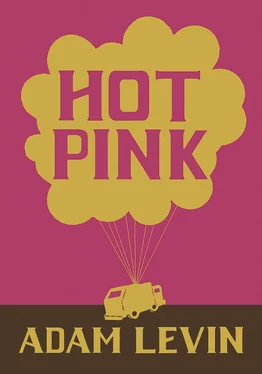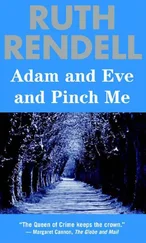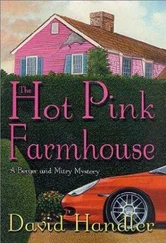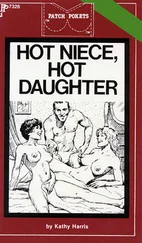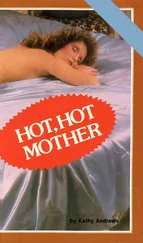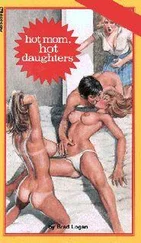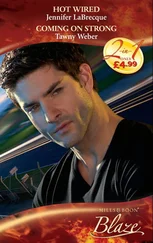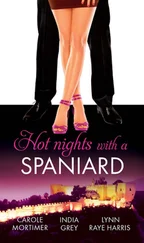One day in mid-August, it was raining, and my sister dropped by my place. Tell was at work. Leah pointed at my bald head and asked me, “When’d you do that?”
“A couple months ago,” I said. I watched a spider crawl out of a crack in the baseboard between us.
Leah said, “It looks good. I have a boyfriend now, and—” and she saw the spider.
She froze in mid-gesture for a second, then jumped over it and got behind me. “Fuck!” she said. “Fuck fuck fuck.”
I put it out with my hand.
“Jesus,” she said. “Not even a paper towel?”
I made like I was confused and then I wiped my hand on my head. It was the first joke I’d cracked in weeks.
“You’re so gross,” she said. “Wash your head. I can’t talk to you like that.”
I went into the kitchen and washed my head in the sink.
“So I have a new boyfriend,” she said.
“Is he a Rick or a Steve?” I said.
“His name’s Aaron, weirdo.”
I said, “How’s Dad? You guys are cool, right? You’ve always been tight.”
“What’s wrong with you?” she said. I came back into the living room. She was jacking around with the equipment in my window-washing bucket. She peeled the foam handle off my chrome-plated squeegee.
“Stop messing with my stuff.”
“Jeez,” she said. “Who made these pictures? That girl Dad talked to on the phone?”
“No one,” I said. I was being a dick to my little sister like some Steve in a sitcom.
“They gave me money and I’m supposed to take you out for pancakes and tell you about my new boyfriend.”
“Okay, but let’s walk,” I said.
She said, “It’s ninety-five degrees outside. And pouring.”
“I’m not letting you drive me anywhere,” I said.
“Then you drive.”
I said, “I don’t want to drive. Do you know how much I have to drive for work? I hate driving.”
“I thought you only said you were an addict to get pity from the judge.”
“I did.”
“Then quit acting like a dry drunk. They send their love and say they miss you. Dad especially. He keeps telling us you’re becoming a man. ‘He’s growing up. He just wants space.’ It’s sad. They think you don’t like us anymore. And you should really start calling them back.” Then she left and I was glad and didn’t want to be.
We sat on the tracks that night, smoking cigarettes. Jane Tell had a swelling eye. Blood at the corners of her mouth. I was staring hard, wanting to touch her. When I turned away, the string of dormant freight cars across the ditch looked small as a train-set. I had to throw a rock and fall short to get my eyes straight. We finished our cigarettes and I lit two more, handed one over.
“You’re a gentleman,” she said. She wiped blood from her mouth with her sleeve, her thumb pushed through a tear in the seam of her cuff. “I think I bit my tongue,” she said.
I didn’t respond, continued to smoke.
She pulled her knees to her chest and worried the drawstrings of her hood. “I’m sick of the tracks,” she said. “Let’s walk to the park behind the high school.”
Tell stood first and pulled me up. We headed toward the school. The moon was orange and the stars were blue and the sky was black. There were slugs in the grass of the outfield. They shined up at us like new dimes, their antennae eyes bent sideways, placidly, stupidly, daring us to put them out beneath our feet. They reminded me of a vacation I’d been on with my father. We’d flown to L.A. and were taking a week to get to Portland in a rented Mustang — a convertible — that he let me drive on Highway 1, even though, at fourteen, I was still months away from getting my permit. “Don’t speed,” he told me. “If you get in trouble, I get in trouble. We’re both breaking laws. Don’t get us in trouble.” I didn’t. We ate good fresh food and saw a couple movies and stayed at motels with cement patios outside their sliding-glass doors that I would go out onto to smoke.
One time I woke up in the middle of the night and wanted a cigarette, but I didn’t want to wake my dad, so I kept the light off on the patio. I’d gone out without a shirt, just boxers and Chucks, and I grew cold and I paced. The ocean was washing against the beach across the motel lawn. From under my shoes came other sounds, crackling and squeaking. Something like the screams of pot-dropped lobsters, but in short bursts and pleasant to listen to. I watched the water move and I thought loosely that I was stepping on wet seashells or unripe berries. To make more of the sounds, I ground my feet against the cement with each step. When I finished smoking, I dropped my cigarette on the patio, and there was another sound, a sizzle. I knew something was wrong.
I crouched down and lit my lighter and saw scores of dead snails, their shells in shards that punctured their skin, some of them torn in half, inside out, wet with that substance that trails them. I’d killed spiders before, and silverfish. I had set fire to anthills. I’d won my only fight in grade school by raking the other boy’s face over playground gravel. I had done those things to be cruel. This was different. I got sick. The next morning, my father went out to smoke on the patio. He said, “What the fuck is this? You were sick? Are you better? Are you sick? Were you drinking?”
“The snails,” I said. “It was an accident. I feel dirty. I really don’t want to talk about it.”
He said, “You sound like your sister with her spiders, boychic. They’re just slugs.” They weren’t — they were snails. Slugs don’t have shells.
The ones in the field lacked shells — they were slugs. Tell hooked her arm in mine. “They catch the moon like bullet casings,” she said. “These slugs look like bullets. Don’t I pun so cleverly? Aren’t I delightful?”
“Stop it,” I said.
Our arms came unhooked. She said, “Do you want to hurt somebody, Ben? We could find somebody,” she said, “and we could hurt them.” She tackled me and put her mouth on my neck. “We could kill them,” she said. We rolled around for a little while. At home, later, I’d find blood on my shirt collar and wonder whose it was.
Tell sat up. Her hood was off and some of her hair had come out of its rubberband. Static held it up in front. “I think we’re sitting in wet,” she said.
“It’s the ground,” I said. “It’s just colder than your body.”
“You’re so smart,” she said. “But if you’re so smart, why aren’t we plotting the perfect murder?” She had the edge in her voice that meant I wasn’t playing well.
“Who hit you?” I said.
“I fell.”
“You’re a liar, Tell.”
“Why won’t you fuck me?”
“Because someone hit you.”
“Listen to you,” she said. “Listen to that . You and all that power in your voice. You won’t fuck me because someone hit me? You won’t drive your car because you fuck me when someone hits me.”
This was the point in the fight-routine at which I could either make her cry by shutting down or fix it up by showing some novel form of affection. I didn’t want her to cry. I put a slug on her knee.
“Hi there, gross cutie,” she said to the slug.
“I want you to meet my family.”
“Let’s get the car and go.”
“We don’t need the car,” I said. The house was across the street.
I let us in through the side door. I could hear them making noises with dishes. We stopped at the threshold between the hallway and the kitchen. My mom and dad were at the table, eating ice cream. Tell stood behind me.
My mom saw me first. “Ben!” she said. “Come here!”
We walked over to the table. “This is Jane Tell,” I said. “We’re getting married.”
I don’t know if it was because they hadn’t seen me in so long or because I shocked them with the marriage bit or because she’d pulled her hood back on, but neither of my parents really saw Tell until after we’d sat down and I’d been kissed by both of them.
Читать дальше
